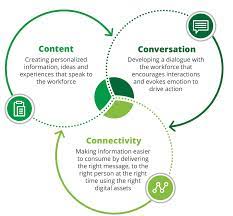Mastering the Art of Strategic Communications: A Guide to Effective Messaging and Engagement
The Power of Strategic Communications
Strategic communications play a crucial role in the success of any organisation. It involves the deliberate planning and execution of communication initiatives to achieve specific goals and objectives. By aligning communication efforts with business strategies, organisations can effectively convey their messages, build relationships with stakeholders, and ultimately drive success.
One key aspect of strategic communications is identifying target audiences and understanding their needs, preferences, and behaviours. By tailoring messages to resonate with different audience segments, organisations can ensure that their communication efforts are relevant and impactful.
Another important element of strategic communications is choosing the right channels to reach target audiences. Whether it’s through traditional media, digital platforms, social media, or other channels, selecting the most effective communication channels can maximise reach and engagement.
Furthermore, strategic communications involve monitoring and evaluating the effectiveness of communication initiatives. By measuring key performance indicators and gathering feedback from stakeholders, organisations can assess the impact of their efforts and make informed decisions to improve future communications.
In today’s fast-paced and competitive business environment, strategic communications have become more important than ever. With the rise of digital technologies and social media, organisations have a plethora of tools at their disposal to communicate with stakeholders in real-time and on a global scale.
Effective strategic communications can help organisations build brand awareness, enhance reputation, manage crises, engage employees, attract customers, and foster trust with stakeholders. By developing a comprehensive communication strategy that integrates various tactics and channels, organisations can create a cohesive narrative that resonates with audiences across different touchpoints.
In conclusion, strategic communications are essential for organisations looking to thrive in today’s complex business landscape. By investing in strategic planning, targeted messaging, channel selection, measurement, and evaluation, organisations can unlock the full potential of their communication efforts and drive meaningful results.
Understanding Strategic Communications: Key Questions and Answers
- What is the strategic function of communications?
- What is the function of strategic communications?
- What is strategic communication in PR?
- What is the job of strategic communications?
- What does a strategic communication major do?
- What is an example of strategy communication?
What is the strategic function of communications?
The strategic function of communications lies in its ability to align organisational objectives with targeted messaging to achieve specific goals. By strategically planning and executing communication initiatives, organisations can effectively convey their messages to the right audiences, build strong relationships, enhance brand reputation, and drive desired outcomes. Strategic communications serve as a guiding force that shapes how information is shared internally and externally, ensuring consistency, clarity, and relevance in all interactions. Ultimately, the strategic function of communications is to empower organisations to navigate the complexities of the modern business landscape with purpose and impact.
What is the function of strategic communications?
The function of strategic communications is to align an organisation’s communication efforts with its overall goals and objectives, enabling it to effectively convey key messages, build relationships with stakeholders, and achieve desired outcomes. By strategically planning and executing communication initiatives, organisations can enhance brand reputation, influence perceptions, manage crises, drive engagement, and ultimately contribute to their long-term success. Strategic communications serve as a guiding framework that ensures consistent messaging across various channels and audiences, helping organisations navigate the complexities of the modern business landscape with clarity and purpose.
What is strategic communication in PR?
Strategic communication in public relations (PR) refers to the deliberate planning and implementation of communication initiatives to achieve specific objectives that align with an organisation’s overall goals. It involves crafting messages that are tailored to target audiences, selecting the most effective channels to deliver those messages, and evaluating the impact of communication efforts. Strategic communication in PR aims to build relationships with stakeholders, enhance brand reputation, manage crises effectively, and ultimately contribute to the success and growth of an organisation. By integrating strategic communication into PR practices, organisations can ensure that their messaging is consistent, relevant, and impactful in achieving desired outcomes.
What is the job of strategic communications?
The primary role of strategic communications is to align an organisation’s messaging and outreach efforts with its overarching goals and objectives. By developing and implementing a well-defined communication strategy, strategic communications professionals aim to enhance brand reputation, engage key stakeholders, manage crises effectively, drive positive public perception, and ultimately support the organisation in achieving its desired outcomes. Through targeted messaging, careful planning of communication tactics, and continuous evaluation of results, strategic communications professionals play a vital role in shaping the narrative surrounding an organisation and ensuring that its messages resonate with the intended audience.
What does a strategic communication major do?
A strategic communication major focuses on developing a deep understanding of how communication influences perceptions, behaviors, and relationships within various contexts. Students in this field learn how to craft compelling messages, identify target audiences, select appropriate communication channels, and measure the effectiveness of communication campaigns. A strategic communication major prepares individuals for careers in public relations, marketing, advertising, corporate communications, social media management, and more. Graduates with a degree in strategic communication are equipped with the skills to create impactful communication strategies that help organisations achieve their goals and build strong connections with their stakeholders.
What is an example of strategy communication?
An example of strategic communication could be a company launching a new product. The communication strategy would involve identifying the target audience, crafting key messages that highlight the unique features and benefits of the product, selecting appropriate communication channels such as social media, press releases, and advertising to reach the target audience effectively, and monitoring the campaign’s performance through metrics like sales figures, customer feedback, and brand perception surveys. By strategically planning and executing communication initiatives around the product launch, the company can generate buzz, drive interest, and ultimately achieve its business objectives.



